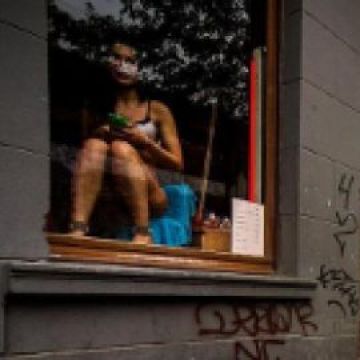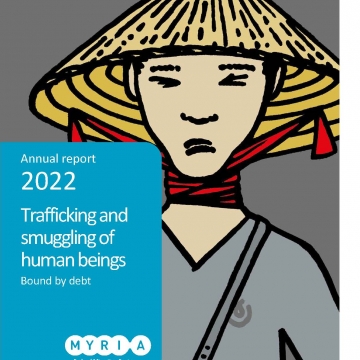Victim status
In Belgium, since the 1990s, victims of trafficking who agree to comply with the legal officials can benefit from a special residence status. This “victim status” rests on a difficult compromise between on the one hand, the will to protect the victims and to offer them future prospects, and on the other hand, the need for an effective fight against trafficking networks.
Which victims?
Victims of human trafficking
Victims of aggravated forms of human smuggling, for example a victim on whom violence has been used or whose life has been put in danger.
What are the criteria?
Victims must fulfill three basic requirements in order to qualify for a victim status:
- leave the person or the network that has exploited them ;
- approach a certified shelter that specializes in receiving human trafficking victims;
- testify against or produce a statement on the people or the network of traffickers that exploited them.
How does the process work?
In practice, the process is carried out in four phases:
1. Discovery and Identification
First line services on the ground play a crucial role in the discovery and identification of trafficking victims. They provide information and direct them to a specialized centre. The possible victim is given a leeway period of 45 days (in the form of an expulsion order) to leave the people who trafficked them and approach a specialized centre. Afterwards the victim has a choice: sumbit an official statement or return to their country of origin.
If the victim is a foreign or unaccompanied minor, they will automatically qualify for a three month residence permit.
2. Temporary Residence
A provisional residence permit is given to victims who provide statements or lodge a complaint within 45 days, in the form of a certificate of registration that is valid for three months. As with the previous phase, seeking help from a specialized centre is compulsory. The victim is entitled to a type C work permit.
3. Extended Stay
The stay will be further prolonged as the enquiry continues and if several conditions are met:
- the prosecution or the work auditors decide the person is a victim of trafficking or a severe case of human smuggling;
- the court case is still being heard;
- the victim demonstrates a clear desire to cooperate and they have cut all ties with their exploiters;
- the victim is not considered at risk of compromising public order or national security.
If these conditions are met, the victim will be able to qualify for a 6 month stay permit (enrolment certificate from the Foreign Register), which will be renewed every 6 months until the end of the legal process.
4. Permanent Residence
If the victim’s complaint or statement has led to a conviction based on human trafficking law, the victim will be able to gain a permanent residence permit. This principal also applies to the case where a conviction is reached on the basis of other legislation but where the prosecution but where the work auditors have withheld a detail of human trafficking in their indictment and where the complaint or the statements were significant in the legal process.
What happens if the conditions are not met?
Temporary travel permits granted to the victim can be withdrawn or not renewed in the following cases :
- if the victim actively, voluntarily, and on their own initiative, rekindles their connection with the people who exploited them;
- if the victim is considered at risk of compromising public order or national security.
Regarding the 6 month residence permit, three other additional cases are planned:
- if the victim ceases to cooperate;
- if the legal authorities have decided to end the process;
- if the cooperation of the victim is fraudulent or their statement is fraudulent or unfounded.

 Publication
Publication
Universal Periodic Review: Parallel report
Parallel report of Myria, Unia and the Combat Poverty, Insecurity and Social Exclusion Service, on the 52nd session of the Universal Periodic Review.
 Publication
Publication
2024 Annual report Trafficking and smuggling of human beings
This annual report, entitled ‘Latin American sex work: a high-risk carousel’, particularly draws attention to the phenomenon of Latin American sex work and calls for the fight against trafficking to be adapted to the new realities of the digital world. These realities are leading to the creation of new, subtle forms of exploitation that require properly adapted investigative resources. Myria is also calling for stronger international collaboration and awareness-raising among the players concerned
_360_360_s_c1.png) Publication
Publication
Gaza Strip: Belgian assistance, evacuations and visa applications
Myria continues to receive reports from Palestinians and Belgians who are deeply concerned about the fate of their relatives trapped in extremely dangerous conditions in Gaza.
 Publication
Publication
2023 Annual report trafficking and smuggling of human beings
Myria is publishing the English version of its 2023 evaluation report, entitled ‘A chain of responsibilities’. With a focus on human trafficking for the purpose of labour exploitation, Myria is calling for more proactive checks and a thorough chain approach.
_360_360_s_c1.png) Publication
Publication
Human rights also apply to single men seeking asylum
8 human rights organisations condemn the decision to temporarily exclude single men from the right to reception within the framework of the asylum procedure.
 Publication
Publication
2022 Annual report trafficking and smuggling of human beings
Myria, the independent national rapporteur on trafficking in human beings, is publishing its 2022 public and independent annual report in English entitled Bound by debt.
